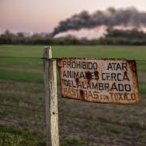English · Español

17 de agosto de 2016 | Noticias | Bosques y biodiversidad | Derechos humanos | Soberanía Alimentaria
Multi-million fine due to agrotoxic use in Paso Picón
Descargar: MP3 (2.8 MB)
Close to Montevideo, capital city of Uruguay, down Route 62 and four kilometres from Canelones city, we can find Paso Picón town. This rural town has been making the news for the past three years over a conflict between the community and a doctor and agricultural producer who is making the population sick with the agrotoxics with which he sprays his crops.
Máximo Castilla has broken numerous times the regulations related to the application of these poisons. The law in force bans mechanized terrestrial applications in extensive crops less than 300 meters away from any urban, suburban area or populated town. As Paso Picón is in a rural area, there wasn´t a minimum distance allowed to spray, but what mattered was the absence of winds over 10km/hour. This wind speed is considered the threshold over which agrotoxic drift takes place. Dr. Castilla had been sanctioned before by the Livestock, Agriculture and Fisheries Ministry and the Canelones Government for spraying under windy conditions and breaking the law. In May 2015, the people affected managed to have Paso Picón declared as a "rural area with urban population", which provided the 300 meter protection to spray. But regardless, the rural producer continued breaking the regulations.
That´s why on Friday, the Canelones Government authorized the application of three fines amounting to 1,058,000 dollars. According to La Diaria newspaper, the fines imposed to the producer are for "spraying in an area that implies harm to the health of the population or the environment”. Although the economic fine does not ensure that the producer will stop spraying his land to the detriment of the health of the neighbors, it is an unprecedented deterrent measure.
Other types of violence exerted by this doctor against some of Paso Picón neighbours are yet to be heard by the court. A few days before the decision by the Canelones Government, Castilla had made news again for assaulting and threatening teacher Adriana Pascual. Pascual lives with her daughter across Castilla´s soy crops in summer and wheat crops in winter. She files a complaint every time he exposes them to agrochemicals. She also submitted her case to the National Human Rights Institute and managed to prove that she and her daughter are victims of agrotoxic poisoning. In December, 2013, Pascual had to stay in a hospital for two days over a case of "pharyngitis-esophagitis caused by exposure to agrotoxics" according to a report by the head of the Environmental Health Division at the Public Health Ministry, Carmen Ciganda, at the request of the Human Rights Institute, accessed by La Diaria. Her daughter was treated for "atopy-asthma, possible exposure to agricultural chemical substances" at the Environmental Pediatric Unit of the Toxicological Information Center.
But they aren´t the only ones who experienced the effects of the exposure to agrotoxics. In the Public Health report, Ciganda described that the inspections carried out allowed to verify that "the population of the area is repeatedly exposed to pesticides which affect their health". The report states that "the symptoms reported by the people affected (headaches, eye pain, oropharyngeal pain, nasal burning, breathing problems, bronchospasm, skin rashes and diarrhea) correspond to the symptoms of acute and repeated intoxication with pesticides".
Last week, Real World Radio inverviewed Adriana Pascual after being assaulted and threatened by Máximo Castilla. She said that after the mutual complaints filed to the police after the incident, the judge in charge of the case ordered to have access to all complaints filed since February 2014.
Imagen: radiopedal.com.uy/








